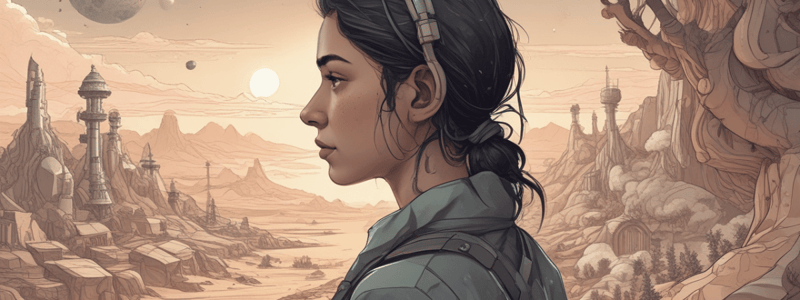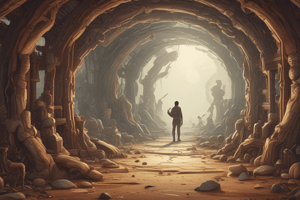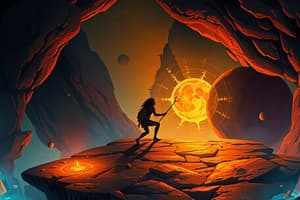Podcast
Questions and Answers
What is the primary driver of scientific progress according to the text?
What is the primary driver of scientific progress according to the text?
- Prejudice
- Knowledge
- Judgment
- Curiosity (correct)
What happens when we discover new things, according to the text?
What happens when we discover new things, according to the text?
- We realize we know everything
- We stop exploring
- We realize we don't know much (correct)
- We become complacent
What is the opposite of curiosity, according to the text?
What is the opposite of curiosity, according to the text?
- Discovery
- Knowledge
- Exploration
- Judgment (correct)
What is imagination's role in curiosity, according to the text?
What is imagination's role in curiosity, according to the text?
What is the outcome for our ancestors who lacked curiosity, according to the text?
What is the outcome for our ancestors who lacked curiosity, according to the text?
What is the emotional aspect of science, according to the text?
What is the emotional aspect of science, according to the text?
Curiosity is a fundamental aspect of human ______, embedded in our DNA.
Curiosity is a fundamental aspect of human ______, embedded in our DNA.
Curiosity allows us to approach things with an open ______ and without prejudice.
Curiosity allows us to approach things with an open ______ and without prejudice.
Human beings are naturally curious, brave, and show great ______.
Human beings are naturally curious, brave, and show great ______.
The realization of how much we don't know fuels further ______ and exploration.
The realization of how much we don't know fuels further ______ and exploration.
Curiosity is the most powerful tool that can ______ and nurtured, especially in children.
Curiosity is the most powerful tool that can ______ and nurtured, especially in children.
Flashcards are hidden until you start studying
Study Notes
The Power of Curiosity
- Curiosity is a fundamental aspect of human nature, embedded in our DNA.
- It allows us to explore and discover new things, driving us to pursue questions and answers.
The Importance of Curiosity in Science
- Science is a human activity that involves curiosity and a desire to understand the world around us.
- Curiosity is the opposite of judgment, allowing us to approach things with an open mind and without prejudice.
- It is a key driver of scientific progress, as it leads us to ask questions, make discoveries, and realize what we don't know.
Curiosity and Human Nature
- Our ancestors who lacked curiosity and did not explore or seek out new knowledge disappeared.
- Human beings are naturally curious, brave, and show great promise.
The Pursuit of Knowledge
- The more we discover, the more we realize how much we don't know, and this realization fuels further curiosity and exploration.
- Science is not just a mental activity but also an emotional one, filling us with joy and wonder.
Nurturing Curiosity
- Curiosity is a powerful tool that can be developed and nurtured, especially in children.
- It involves asking questions, seeking answers, making mistakes, and learning from them.
- Imagination plays a crucial role in curiosity, as it allows us to envision and create new realities.
The Value of Curiosity
- Curiosity is the most powerful tool we possess, driving us to explore, discover, and understand the world.
- It is essential for personal growth, scientific progress, and human development.
Studying That Suits You
Use AI to generate personalized quizzes and flashcards to suit your learning preferences.




